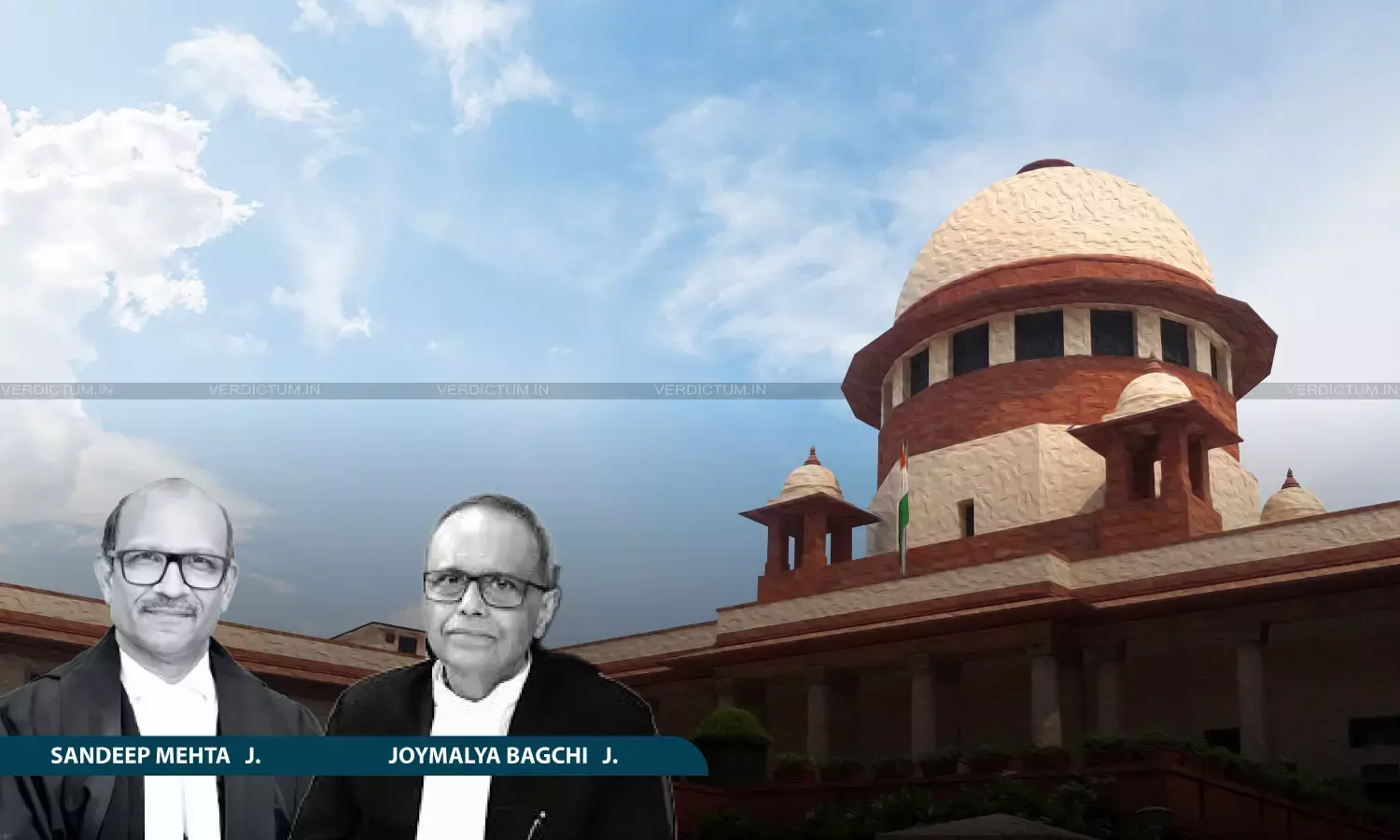Mere Threat To Inflict Harm In Isolation Would Fall Short Of Proof Of Conspiracy To Commit Murder: Supreme Court Upholds Acquittal Order
The appeals before the Supreme Court were filed by the appellant-State of Rajasthan assailing the judgment acquitting the accused-respondents in a case registered under Sections 302 read with Section 120-B, 143 and 201 of the IPC.

Justice Sandeep Mehta, Justice Joymalya Bagchi, Supreme Court
While upholding an order acquitting the accused persons in an alleged case of murder, the Supreme Court has held that mere threat to inflict harm may constitute an incriminating circumstance, but in isolation, the said circumstance would fall short of proof of conspiracy to commit murder.
The appeals before the Apex Court were filed by the appellant-State of Rajasthan assailing the judgment passed by the Rajasthan High Court, acquitting the accused-respondents in a case registered under Sections 302 read with Section 120-B, 143 and 201 of the Indian Penal Code, 1860.
The Division Bench of Justice Sandeep Mehta and Justice Joymalya Bagchi noted, “Other than the evidence of the so-called threat given by respondent-Bhanwar Singh in presence of Sayri Devi (PW-12), which the High Court found to be highly doubtful and exaggerated, no other evidence was led by the prosecution to link respondent-Bhanwar Singh with the alleged murder of the deceased-Shri Suresh.”
“Suffice it to say that mere threat to inflict harm may constitute an incriminating circumstance but in isolation, the said circumstance would fall woefully short of proof of conspiracy to commit murder”, it added.
Factual Background
The incident dates back to the year 2006 when the complainant lodged a missing persons report alleging that his father had gone missing. It was stated in the report that his father had some ongoing disputes with Vijay Punia and Gokalram pertaining to certain lands situated in the village Nandri District, Jodhpur. It was alleged that a phone call was received from a property dealer, and the same was attended by the complainant’s father, who conveyed to the caller that he would be visiting the subject site the next day. While the action upon the missing person report was being contemplated, a message was received at the Police Station regarding the discovery of a dead human body lying between two villages. The complainant identified the body as that of his father.
Pursuant to recovery, an FIR came to be registered, and the accused-respondents were arrested. The Trial Court found the accused-respondents guilty of charges and proceeded to convict and sentence them. In appeal, the High Court set aside the conviction by extending the benefit of doubt on the ground of insufficiency of evidence and patent infirmities in the prosecution case.
Reasoning
Referring to the aspect of the phone call, the Bench noted that neither Meena Sharma (PW-24) nor Meenkashi (PW-27) had any idea about the identity of the person who made the call, who was admittedly a stranger to them. These ladies did not claim to have ever met the caller before. The Bench found no substantive evidence to prove that any person by the name Dhanesh, alleged to be the brother of respondent-Hemlata, had actually called on the landline number operational in the house of the deceased-Shri Suresh. “If at all, the prosecution was desirous to prove this fact, the relevant call detail records supported by the certificate under Section 65-B of the Evidence Act had to be brought on record and proved as per law. However, this evidence is totally lacking from the side of the prosecution”, it added.
It was further noticed that the High Court held that the fact pertaining to the movement of the deceased near the house of respondents-Hemlata and Narpat Choudhary few hours before his death was very significant and in normal course of events, any person of ordinary prudence would have disclosed this to the relatives of the deceased and the police as an immediate reaction after seeing the body of the deceased-Shri Suresh. “Thus, the High Court found the conduct of Hukum Singh (PW-8) in keeping silent for more than a month to be highly suspicious and rightly so, in our opinion”, it added.
Moreover, the High Court, after a threadbare discussion of evidence, held that the entries made in the registers, in no manner, connected the respondent Narpat Choudhary with the persons (hired killers) who allegedly stayed at these two hotels. “The prosecution failed to lead any evidence to establish the fact that respondent Narpat Choudhary had facilitated the stay of the socalled hired killers in the aforesaid hotels. We find the said finding of the High Court to be unimpeachable”, it said.
On the aspect of recovery of a chunni (stole) having blood stains of human origin at the instance, the Bench noted, “Suffice it to say that otherwise also, the said recovery is insignificant and does not connect respondent-Hemlata with the murder of the deceased-Shri Suresh in any manner. This is primarily so because no opinion was obtained from the Forensic Science Laboratory regarding the group of blood found on the chunni. Unless the chunni was shown to be having the same blood group as that of the deceased-Shri Suresh, the recovery thereof even with blood stains of human origin would be inconsequential and cannot link respondent-Hemlata to the crime.”
The Bench was of the view that the non-production of the certificate under Section 65-B of the Evidence Act, and the call detail records being presented through a handwritten note without examining the scribe thereof, would lead to an inescapable conclusion that the call details were not proved as per law.
Thus, finding no valid grounds that would justify upsetting and reversing the acquittal of the respondents, the Bench dismissed the appeals.
Cause Title: State of Rajasthan v. Bhanwar Singh (Neutral Citation: 2025 INSC 1166 )

